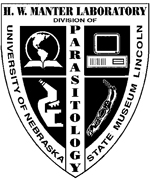Parasitology, Harold W. Manter Laboratory of

Harold W. Manter Laboratory of Parasitology: Library Materials
Document Type
Article
Date of this Version
2-22-2012
Citation
Witsenburg et al. Malaria Journal 2012, 11:53 http://www.malariajournal.com/content/11/1/53
Abstract
Background: The majority of Haemosporida species infect birds or reptiles, but many important genera, including Plasmodium, infect mammals. Dipteran vectors shared by avian, reptilian and mammalian Haemosporida, suggest multiple invasions of Mammalia during haemosporidian evolution; yet, phylogenetic analyses have detected only a single invasion event. Until now, several important mammal-infecting genera have been absent in these analyses. This study focuses on the evolutionary origin of Polychromophilus, a unique malaria genus that only infects bats (Microchiroptera) and is transmitted by bat flies (Nycteribiidae).
Methods: Two species of Polychromophilus were obtained from wild bats caught in Switzerland. These were molecularly characterized using four genes (asl, clpc, coI, cytb) from the three different genomes (nucleus, apicoplast, mitochondrion). These data were then combined with data of 60 taxa of Haemosporida available in GenBank. Bayesian inference, maximum likelihood and a range of rooting methods were used to test specific hypotheses concerning the phylogenetic relationships between Polychromophilus and the other haemosporidian genera.
Results: The Polychromophilus melanipherus and Polychromophilus murinus samples show genetically distinct patterns and group according to species. The Bayesian tree topology suggests that the monophyletic clade of Polychromophilus falls within the avian/saurian clade of Plasmodium and directed hypothesis testing confirms the Plasmodium origin.
Conclusion: Polychromophilus’ ancestor was most likely a bird- or reptile-infecting Plasmodium before it switched to bats. The invasion of mammals as hosts has, therefore, not been a unique event in the evolutionary history of Haemosporida, despite the suspected costs of adapting to a new host. This was, moreover, accompanied by a switch in dipteran host.


Comments
Open access.